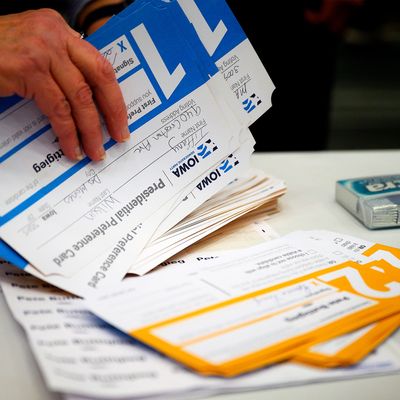
At some unspecified hour or day, the world will learn who won the Iowa Democratic caucuses. This moment, suspended between the first signs that the party’s process for reporting results had gone wrong, and final resolution, is temporary. But it is chaotic, and chaos breeds conspiracy theories. To some activists, Iowa’s shambolic caucuses are further evidence that the party will do whatever it can to knock left-wing candidates like Senator Bernie Sanders of Vermont out of the race. They aren’t wrong to be suspicious. Into the void the party created stepped Mayor Pete Buttigieg, who declared victory around midnight. A statement from the Biden campaign suggested the eventual results would be illegitimate. The candidate most harmed by all this confusion is Sanders, for whom victory in Iowa would have confirmed his status as a leading primary candidate.
It’s not a secret that party leaders and donors are ill disposed toward Sanders and toward left-wing insurgents in general. But that hostility is not proof by itself that a conspiracy derailed the Iowa caucuses. There are other, more realistic culprits, and only one sensible conclusion to reach: The national party is too incompetent to conspire successfully against any candidate. Its overweening reliance on consultants, lack of a cohesive message, and lackluster investment in its state affiliates render it weak and dysfunctional. If Democratic loyalists are looking for someone to blame for the divisive reaction to Iowa’s failures, they should blame the party itself.
The potential for mayhem in Iowa was evident well before Democrats arrived at their precincts. “Caucus chairs are more concerned this cycle than I’ve ever seen them. They’re very nervous,” one Iowa Democrat recently told The Atlantic. To satisfy Sanders supporters who worried the old rules unfairly handicapped their candidate, party officials drafted complicated new reforms. At the same time, they introduced a new app intended to help them report results. The app, of course, had problems of its own. As The Wall Street Journal reported in January, experts worried it presented a security risk. It also just didn’t work. In a statement released on Tuesday, the Iowa Democratic Party admitted that a coding error had prevented many caucus chairs from reporting their results.
As disasters go, Iowa’s was preventable. An app might look like a shiny new toy to some party officials, but it’s not necessarily the best way to simplify the process of reporting results. The security risks were real, the potential for error was profound, and, crucially, the app itself was unnecessary. A crowded primary field was always going to complicate the caucus process, but that is a problem that additional volunteers on the phones could have helped resolve. The party’s decision to go in a different direction, and use the hilariously named Shadow Inc. on an app, points to existing and widespread problems. It’s not as if the app was developed by high-school students, though they might have done a better job. According to the Des Moines Register, the third-party vendor worked with Harvard’s Defending Digital Democracy Project and “worked with campaign experts Robby Mook and Matt Rhodes.” The consultant class appears to function principally as a jobs guarantee for out-of-work campaign aides, but from email fundraising strategies to digital messaging to the infamous app, it doesn’t look like Democrats are getting much for the party’s money. Endemic grift could rot the party’s infrastructure to pieces.
Grift is its own conspiracy, in this case the disingenuous sale of hope in exchange for consulting work. Activists tend to accuse the party of other, more blatant sins, like the outright theft of votes or the rigging of primaries. What happened in Iowa is almost certainly not theft. But it’s understandable that supporters of Sanders, in particular, see malice where incompetence probably lies.
As a national institution, the Democratic Party has given them few reasons to trust its motivations. The Democratic Congressional Campaign Committee blacklisted vendors who worked with progressives challenging centrist incumbents. Headlines are replete with tales of Democratic donors frightened by the prospect of a Sanders candidacy. Then there’s the app itself. The team behind its creation was acquired last year by Acronym, a firm co-founded by a veteran of Hillary Clinton’s 2016 tech team. The Buttigieg campaign is a Shadow client, the Los Angeles Times reported, though for a different digital service; other investors include the Biden and Gillibrand campaigns. On Twitter, Acronym’s CEO complained at length about Sanders supporters who had “zero interest” in party unity, and responded to Buttigieg’s campaign announcement with a series of heart emoji. Further fueling the flames of conspiracy, Acronym also invests in CourierNewsroom.com, which NewsGuard described as a for-profit media company that mostly advertises the efforts of moderate Democrats in Congress. On Wednesday, the Daily Beast reported that Acronym was scrubbing its website of any evidence of its ties to Shadow. An understandable public-relations effort, but the move doesn’t exactly dispel fears that a conspiracy was afoot.
Do any of these events prove that Shadow tried to rig Iowa for Buttigieg, with an assist from Acronym? No. But the party has no authority to scold its critics. It faces a crisis of legitimacy entirely of its own making.






























